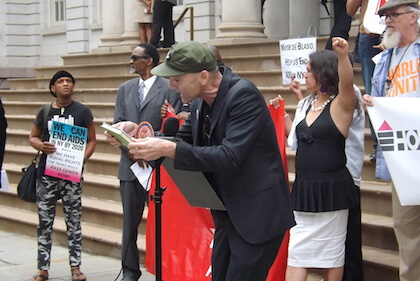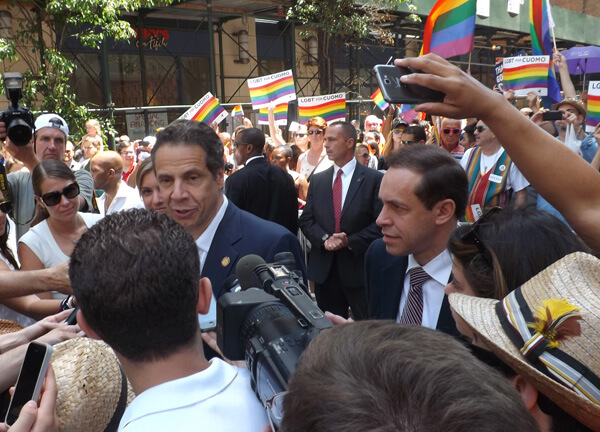Callen-Lorde's Dr. Gal Mayer. | GAY CITY NEWS
Citing new meningitis cases among gay and bisexual men in addition to the 12 it reported on September 27, New York City’s health department expanded the target population for its meningitis vaccine campaign in a November 29 announcement.
And the Callen-Lorde Community Health Center, the Chelsea clinic that has vaccinated about 700 of the nearly 2,000 people vaccinated to date, is saying the health department is moving slowly and not publicizing the campaign sufficiently.
The department first noted the outbreak on September 27. On October 4, it recommended vaccination for any HIV-positive man who had sex “with another man that he met through a website, digital application (‘App’), or at a bar or party since September 1.”
In the latest alert, the department recommended that men, regardless of HIV status, who live in ten North Brooklyn neighborhoods and have had sex with another man since September 1 should get vaccinated. The agency also suggested that men who have had sex with another man in the past three months be offered the vaccine “regardless of HIV status” or where they live.
In effect, the department now recommends that all gay and bisexual men who have had recent sex with a man should consider getting vaccinated. While HIV-positive men probably see their doctors regularly, that may not be true of HIV-negative men so they may not hear about the vaccine campaign.
“Now they’re talking about HIV-negative men who may or may not be engaged in healthcare,” said Dr. Gal Mayer, Callen-Lorde’s managing director of clinical services. “Where is the public messaging? Where are all the alerts for gay men to come in and see their provider? That’s what is needed at this point. If we really want to vaccinate 10,000 people, I think it’s time to step up the public messaging.”
At an October 16 presentation at the Physicians’ Research Network, Dr. Marcelle Layton, the assistant commissioner at the department’s Bureau of Communicable Disease, told attendees at the educational group, “The estimate is about 10,000 that we’re aiming to vaccinate,” according to a video posted on the network’s website.
“We recognize that uptake has been slow,” Layton acknowledged, after saying the department was “investing a little bit of money” in a media campaign.
In an email, the department press office told Gay City News it is “working with community based organizations, the medical community, and key opinion leaders (e.g., bloggers) to inform them about the outbreak and spread the message to persons eligible for vaccination.”
The agency has advertised “on several social media sites” and will distribute “posters and palm cards” at medical facilities and gay-friendly venues.
In the latest alert, the department reported seeing 16 “invasive meningococcal disease” cases among gay and bisexual men since 2010, with 11 occurring in the past 12 months. Four of the men are dead. The agency estimated that “15%-20% of the initial target population” — of HIV-positive men — have received the first dose of the two-dose vaccine since October 4.
At the network event, Layton said that one or two men who visited New York City may have carried the bug to other jurisdictions. The press office said one such case was under investigation.
“We are investigating one case right now to confirm that it is, in fact, part of this outbreak, and will work with the appropriate jurisdiction to report this case when it is confirmed,” the press office wrote.
Two other North American cities that had meningitis outbreaks among gay men responded faster.
Two of six gay men with meningitis in Toronto died in an outbreak from “early May to mid-July of 2001,” according to a 2003 study. Toronto health officials administered 3,850 vaccine doses free of charge in 50 locations, including bathhouses and a community center, from July 25 through August 18 of that year. Toronto saw no additional cases.
An October 2003 outbreak in Chicago that killed three of six infected gay men led to an eight-day vaccination campaign that administered 14,267 doses at six sites, according to a 2007 study. There were no new cases.
“So eight weeks later, we’ve vaccinated 2,000 people, of which Callen-Lorde has vaccinated 700, and there’s been two additional cases,” Mayer said. “It’s really not moving very quickly.”
In a 2009 study in Clinical Infectious Diseases, New York City health department staff reported on a 23-case meningitis outbreak among drug injectors in Central Brooklyn in 2006 that killed seven people. Between June 28 and September 30 of that year, the department vaccinated 2,763 people. The study noted that an additional three cases were seen after the campaign.
Among infections in this year’s outbreak that were analyzed, the department noted, in the September 27 alert, that “6 of 7 infections are related to a strain of N. meningitidis that was responsible for the 2006 outbreak in New York City.”
The Gay Men’s Health Crisis (GMHC), which is not licensed to administer vaccinations, held a community forum on meningitis and is informing its clients about the vaccination campaign.
“They’ve been contacting us with great frequency,” Marjorie J. Hill, Ph.D., GMHC’s chief executive officer, said of the health department. “I think they’ve been, from our perspective, they’ve handled this in a very thoughtful and thorough manner.”


































